Many seniors living in Jupiter, Delray and Palm Beach County have retired and moved to Florida from other states, having left their immediate families behind. SmartAsset calculated the number of people over the age of 60 moving to each state during 2014 and no surprise, Florida was first with a net migration of 57,724 seniors. After leaving their home states for Florida retirement, many families worry about their parents living alone. The likelihood of living alone increases with age; Among women age 75+, almost half (47 percent) live alone.
Time to Purchase a Medical Alert System
Whether you are 28 or 88, “Help! I’ve fallen, and I can’t get up,” has become a widely recognized phrase originating from the 1989 television commercial for LifeCall, a medical alert pendant device. In the ad, an elderly woman falls in her bathroom and uses her medical alert pendant to call a dispatcher to send for help.
When you research and purchase a medical alert system, remember it is for someone else: This is not a gift. Discuss options with your loved one and be sure to include them in decisions that will affect how and where it is to be used and how much you will pay.
Home-based
Medical alert systems were originally designed to work inside the home with a simple base unit plugged in and linked to a landline telephone. Once incapacitated, but still alert enough to speak, the person presses a button on a wearable pendant (bracelet, watch or necklace) which automatically calls to a dispatcher through the base unit. If they can’t get close enough to the base unit, around 1500 feet, to respond to the agent, they will call people on your contact list before calling 911. Keep in mind if your loved one is hard of hearing and does not have their hearing aides in when they fall, the base unit needs to be loud enough.
Mobile
Now companies offer mobile options as well. The newer cellular systems may be used at home, but they also provide security by allowing someone to call for help over cellular networks and using a GPS location while out. The GPS feature allows them to pinpoint the location of the person, an advantage if your loved one gets lost or presses the call button for help, but is unable to speak. Mobile models are usually larger and heavier than a standard portable push button, but are still small enough to be worn as a pendant. They also contain a help button that initiates a call to the dispatcher at a help center, and a speaker and microphone for two-way communication. Mobile pendants are powered by rechargeable batteries. No need to subscribe to a cellular service provider, it will be handled and billed by the medical alert service provider. As with landline systems mentioned above, cellular systems are very easy to install.
Monitoring Services or Not?
The majority of medical alert systems are monitored to connect you with someone at a 24/7 dispatching center and carry a monthly fee in addition to the purchase price of the unit. The non-monitored systems will automatically dial a friend and/or family member on an emergency call list when the button is pushed. These products can be programmed to call several people and to contact emergency services if there is no answer from the first contacts on the list.
Should you add a fall-detection feature?
Some medical alert systems offer an automatic fall detection sensor for an additional monthly fee. When the system detects a fall, it will contact the dispatch center just as if you had pressed the call button. The fall-detection feature can have flaws such as being too sensitive and creating fall alerts when the pendant is dropped.
Digital Assistants (Alexa, Google Home)
These devices may not have all the features you need. For example, Alexa and Google Home can dial landline and mobile phone numbers. But right now, neither can call 911, which medical alerts can do.
Alert Systems for those with Dementia and Alzheimer’s
MedicAlert has partnered with the Alzheimer’s Association for Safe Return, a 24-hour nationwide emergency response service for individuals with Alzheimer's or related dementia who wander or have a medical emergency. They provide 24 hour, nationwide assistance no matter when or where the person is reported missing.
Reviews and Subscription Pricing
According to a June 2018 review by PC Magazine. Everything you need to know to find the right one for yourself or an elderly family member, “Most medical alert systems offer no-contract monthly subscriptions, but there are some that require a multi-year commitment. A landline-based in-home system can range in price from around $25 up to $35 per month, and includes everything you need to get up and running in minutes. Cellular in-home subscriptions are a bit more expensive; expect to pay anywhere from $35 to $45 per month. Mobile systems can run as high as $65 to $75 dollars per month, and some services may require a one-time mobile device fee of up to $150 upfront. In April 2018, Consumer Reports offered expert advice on what you need to consider before you purchase a medical
alert system, and a breakdown of the features and costs of eight companies’ offerings.




